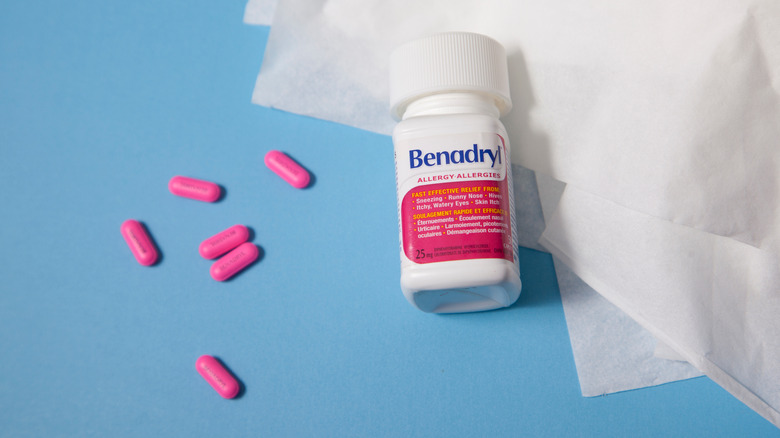Can You Take Benadryl On An Empty Stomach?
Living with allergies can be challenging, especially if your immune system reacts to pollen, dust, and other common substances. Generally, allergic reactions may cause a runny nose, sneezing, skin rashes, and eye discomfort, but some people can have more severe symptoms, such as difficulty breathing, explains the Asthma and Allergy Foundation of America. In the worst-case scenario, you may go into anaphylactic shock, a life-threatening hypersensitivity reaction.
While there's no cure for allergies, you can manage their symptoms through lifestyle changes. For example, someone allergic to polyester may need to stop wearing clothes made with this fabric, says Healthline. Polyester bedsheets, carpets, or even toys can trigger allergic reactions too. Depending on your symptoms, you may also have to take antihistamines, apply steroid creams, or use decongestants. In more severe cases, doctors may recommend allergy shots or corticosteroids.
Benadryl and other antihistamines are drugs that suppress the effects of histamine, a compound secreted by the immune system in response to allergens, notes the Cleveland Clinic. Histamine modulates inflammation, gastric acid secretion, and other processes. However, too much of it can cause watery eyes, fatigue, coughing, or skin rashes. Diphenhydramine, the active compound in Benadryl, is a first-generation antihistamine prescribed for hay fever, food allergies, hives, and allergic conjunctivitis. Like other similar drugs, it has a number of side effects, such as constipation and drowsiness. This brings up the question, can you take Benadryl on an empty stomach? Is it safe or would it make things worse? Let's find out.
What you should know before taking Benadryl for allergies
Benadryl or diphenhydramine is an over-the-counter drug that may help relieve allergic reactions and improve sleep, explains WebMD. In some cases, it can be used to prevent and ease motion sickness. Some versions of the drug are particularly effective for sinus pressure, sneezing, or itchy eyes, while others can ease the discomfort caused by skin rashes or insect bites (via Benadryl). This medication is generally safe, but it may cause drowsiness and other mild side effects.
The American version contains diphenhydramine, which can be taken with or without food, says WebMD. The British version, on the other hand, contains the active ingredient acrivastine, according to the Electronic Medicines Compendium (EMC). Some versions available in the UK may contain cetirizine dihydrochloride, reports the EMC. These compounds have similar side effects, including but not limited to dizziness, skin rashes, and dry mouth.
If you have a sensitive stomach, consider taking Benadryl — or other antihistamines — with food or milk, suggests the Mayo Clinic. Last but not least, refrain from drinking alcohol during treatment, recommends the manufacturer's website. Alcoholic beverages can increase drowsiness, making it hard to stay focused and carry out your daily tasks.


